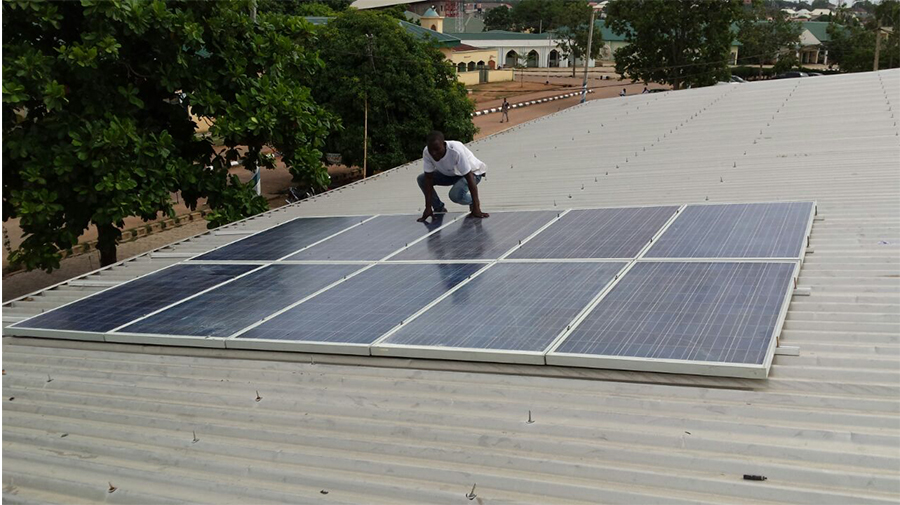
A group of highly-skilled engineering alumni, Master’s and PhD students from Masdar Institute have formed a startup company called the Nigeria Future Energy Group (NiFEG), focused on clean energy development and deployment throughout Nigeria.
Fully incorporated in Nigeria, NiFEG is a non-profit organization with the ultimate goal of providing local energy solutions sustainably in Nigeria. The startup has successfully emerged out of the community of Masdar Institute’s innovative students, faculty and alumni.
“We believe the private sector has a huge role to play in solving Nigeria’s energy crisis,” said NiFEG member Adewale Giwa, a Masdar Institute PhD student. NiFEG wants to promote sustainability by accelerating the use of clean and renewable energy in Nigeria.
Nigeria’s solar resource is approximately 4.85 billion MWh/day and utilizing only a fraction of this resources would be sufficient to provide the entire country with clean electricity. However, currently there is limited exploitation of the country’s solar potential. This gap between Nigeria’s energy needs and its renewable energy potential inspired Giwa and his colleagues to develop NiFEG.
Since the non-profit’s official launch in January 2015, NiFEG has already contributed to the development of a photovoltaic solar system in Kaduna State University, which is a government-owned research university in the northern part of Nigeria. The solar energy system, which provides 2.25 kW of electricity and 19.2 kWh of energy storage, powers two of the university’s lecture theaters.
As native Nigerians with specialized engineering skills from Masdar Institute, NiFEG’s entrepreneurs are combining their expertise in renewable energy technologies and knowledge of the Nigerian economy to place NiFEG ahead of the curve of other renewable energy companies in Nigeria. All of its founding members have published articles in research journals or conference proceedings while at Masdar Institute, related to solar energy, biomass to energy conversion, and carbon dioxide capture and storage.
“A strategic leverage we have over our competitors is the education and experience we gained from Masdar Institute,” Giwa remarked.
The startup has partnered with several high-level organizations, including Nigeria’s Federal Ministry of Power, Kaduna State University, Ahmadu Bello University, the Global Alliance for Clean Cookstoves, Qantab, NordOest, Soraytec, and ar estudio – an industrial design company. The non-profit works with its partners, sponsors and member organizations to raise awareness and provide technical information on available renewable energy resources and technologies in Nigeria.
As a result of their proven analytical skills and expertise in Nigeria’s energy sector, five NiFEG members – Oghare Ogidiama, Adetunji Alabi, Jubilee Adeoye, Ahmed Sodiq and Ayoola Brimmo – have contributed to the drafting of Nigeria’s climate change bill, at the request of the Climate Change Committee of Nigeria’s National House of Representatives. This bill has also passed second reading on the floor of the Senate of Nigeria. The bill proposes the creation of a climate change agency and several policy initiatives to improve the country’s institutional capacity to deal with climate change.
One way NiFEG intends to raise awareness is through its Mentorship Program, which aims to create a competition for undergraduates where candidates will be mentored in executing feasible sustainable energy projects in Nigeria.
In another effort to provide pertinent technical data about deploying solar systems to tap into Nigeria’s solar resources, NiFEG has developed a solar system calculator that can be used to obtain size and cost estimates for solar systems in Nigeria. The solar calculator is available for public access on their website at www.nifeg.com/solarcalculator.html.
The company will generate revenue from subscription fees, philanthropic contributions and sales of expertise services, including consultation, strategy formulation and creation of market exposure. NiFEG is also gathering meteorological data for Nigeria, which may serve as an additional revenue stream.
Expanding beyond Abu Dhabi to address the challenges of global climate change, the creation of NiFEG reflects Masdar Institute’s role in bringing sustainability and clean energy to the world.
Erica Solomon
News and Features Writer
08 September 2016